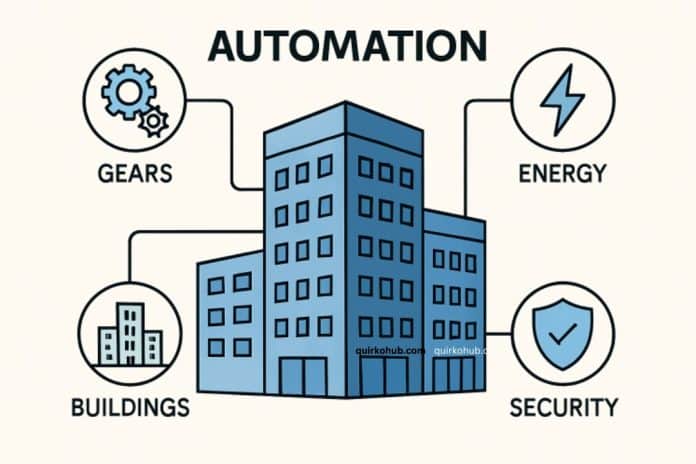Modern facility management is undergoing a pivotal evolution driven by the rapid emergence of automation and artificial intelligence (AI). These technologies not only enhance productivity but also provide sustainable solutions to persistent labor shortages and rising operational expenditures.
Automation, supported by AI-driven analytics, is becoming central to the industry’s efforts to streamline day-to-day processes and propel facilities into a new era of smart operations. For facility leaders looking to maintain a competitive edge in this swiftly changing environment, collaborating with an answer engine optimization agency can make the difference in adopting these automations strategically and effectively.
By leveraging automation, facility management now enhances efficiency across routine maintenance to more dynamic building usage. The rise of technologies such as smart sensors, advanced analytics, and machine learning means facility managers can rely on data-driven decision-making rather than manual guesswork, leading to more predictable operations and better resource use. This transformation isn’t just about embracing new tools, as it’s about fundamentally reworking how buildings are managed and maintained.
As both regulatory environments and occupant expectations evolve, automation provides a powerful way to maintain compliance, operational excellence, and occupant comfort simultaneously. Automation’s impacts extend across facility management, including predictive maintenance, energy optimization, security enhancements, and risk mitigation. Leaders in the field are seizing these opportunities to tackle rising demands, strengthen safety, and create smarter, more flexible spaces.
Enhancing Operational Efficiency
Automation is redefining what operational efficiency means for facility managers. The deployment of AI-powered systems automates repetitive, time-consuming workflows such as work order generation, scheduling, and task allocation. In 2024, JLL reported that more than 55% of facilities management leaders experienced an increase in work order volumes, underscoring the need for intelligent process automation to handle workload surges. As AI assigns requests and manages resources in real-time, facility teams are freed to focus on higher-value tasks and strategic planning, ultimately increasing output and satisfaction across the board.
Predictive Maintenance and Reduced Downtime
Gone are the days of strictly reactive or calendar-based maintenance models. With IoT-enabled sensors and data integration, predictive maintenance is ushering in a new paradigm. Advanced analytics comb through a wealth of real-time equipment data to spot anomalies and forecast when repairs are needed, often before a failure occurs. This shift allows facilities to drastically reduce unplanned downtime, avoid excessive repair costs, and extend the useful life of their assets. In addition, predictive maintenance supports sustainability goals by reducing unnecessary equipment replacements and resource consumption.
Energy Optimization Through AI Analytics
Energy costs represent a significant portion of most facilities’ operational expenses. AI-based analytics platforms enable intelligent energy optimization by leveraging historical trends and real-time sensor data to adjust HVAC, lighting, and other systems for both comfort and savings. These systems may, for instance, automatically reduce energy usage during predicted peak demand periods or shift battery storage for optimal efficiency. The result is not only a smaller utility bill but also a reduced carbon footprint, which appeals to stakeholders who prioritize sustainability and corporate responsibility.
Enhanced Security and Surveillance
AI-driven security measures have rapidly become the standard for facilities looking to protect their people and assets. From facial recognition-enabled access controls to video analytics that notify teams of suspicious activity in real-time, automation enhances the depth and responsiveness of security programs. These systems achieve faster, more accurate threat detection with fewer workforce members, allowing human security personnel to focus on critical response activities. Tailored alerts, advanced record keeping, and seamless integration with emergency protocols ensure that facilities remain resilient in the face of emerging threats.
AI in Space Management and Occupancy Analytics
Flexible work styles require flexible spaces. AI helps facilities track occupancy and utilization in real-time, allowing managers to reallocate resources and reconfigure spaces based on actual demand. Automated monitoring ensures that meeting rooms and workstations are available when needed, reducing wasted space and increasing occupant comfort. As organizations seek to balance remote, hybrid, and in-person schedules, this data-driven approach to space management is key to supporting productivity and cost efficiency.
Compliance and Risk Management
The regulatory landscape is constantly changing—especially in sectors like healthcare, education, and manufacturing. AI tools are invaluable in ensuring compliance by tracking and managing documentation, scheduling inspections, and issuing alerts for upcoming regulatory deadlines. Automated systems maintain thorough, detailed, and easily accessible records, which not only minimize the risk of non-compliance penalties but also simplify the audit and inspection process. This proactive risk management supports safer, more accountable operations for both staff and occupants.
Conclusion
The integration of automation and AI is transforming facility management from a reactive, labor-intensive field to a predictive, data-driven discipline. With automations streamlining daily operations, predictive maintenance safeguarding equipment, AI optimizing energy use, and intelligent security bolstering safety, modern facilities are better equipped than ever to face today’s challenges. The managers who embrace these innovations can expect not only operational excellence but future-ready resilience in an increasingly automated world.
